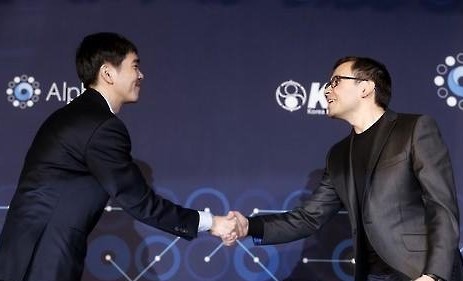- California Assembly OKs highest minimum wage in nation
- S. Korea unveils first graphic cigarette warnings
- US joins with South Korea, Japan in bid to deter North Korea
- LPGA golfer Chun In-gee finally back in action
- S. Korea won’t be top seed in final World Cup qualification round
- US men’s soccer misses 2nd straight Olympics
- US back on track in qualifying with 4-0 win over Guatemala
- High-intensity workout injuries spawn cottage industry
- CDC expands range of Zika mosquitoes into parts of Northeast
- Who knew? ‘The Walking Dead’ is helping families connect
Lee Se-dol says machine not superior despite 1:4 defeat

South Korean Go player Lee Se-dol (L) shakes hands with Google DeepMind CEO Demis Hassabis at their post-match press conference at Four Seasons Hotel in Seoul on March 15, 2016. Lee played Go matches against AlphaGo, an artificial intelligence program developed by Google DeepMind. (Yonhap).
By Joo Kyung-don
SEOUL (Yonhap) — Despite losing the tournament, South Korean Go master Lee Se-dol said Tuesday that he doesn’t feel that Google’s artificial intelligence (AI) program AlphaGo has superior playing skills in the ancient board game Go.
“I can’t accept that it (AlphaGo) has better playing skills, but it has a concentration level which humans can’t beat easily,” Lee said. “I think humans can’t chase AlphaGo in terms of psychological and concentrational aspects.”
Lee lost his last match against the self-learning program and surrendered the five-round Go tournament with a final score of 4-1. AlphaGo already clinched the series win and prize money of US$1 million after winning three straight games last week before Lee struck back with a victory on Sunday.
“I wanted to end the tournament with good results, but feel sad that I couldn’t do it,” he said. “As I said before, this is not a loss for man, but a loss for me. This tournament really showed what my shortcomings are.”
The 33-year-old vowed that this experience against the self-learning program will make him a better player in the future. Apparently, the matches against AlphaGo re-ignited his interest in the game.
“At some point in the past, I doubted myself whether I was enjoying the game,” he said. “But I enjoyed Go so much playing against AlphaGo this time.”
Lee, a ninth-dan player who went pro at the age of 12, said that he does have some little regret about the tournament result.
“It took some time to adjust to AlphaGo’s playing style and the atmosphere of the game,” he said. “But I doubt whether I can beat AlphaGo again in terms of the psychological aspect as I see it concentrates till the end without getting shaken.”
He said in order to beat AlphaGo, which already beat European champion Fan Hui before edging Lee, the player said he needs to study harder.
“This match raised doubts on Go and human creativity,” he said. “By watching AlphaGo’s sequences, it made me think whether our usual sequences are right. I need to study more on this.”
Fellow Go players praised Lee’s “great challenge” against the Google AI.
“I just liked his challenge because in the fifth match, he countered AlphaGo in a calculation game which computers do best,” said Kim Seong-ryong, a ninth-dan player who commentated the match on Tuesday. “It would have been great if he won, but Lee is a great man, nevertheless.”
Hong Seok-hyun, chairman of the Korea Baduk Association (KBA) said that this historic man-versus-computer showdown has gotten everyone excited and will surely raise the popularity of Go all over the world.
“I knew one day we are going to have this moment, but I really wanted humans to win this time,” he said. “Everyone had an interesting time and I think we were all excited about possibilities of AI.”
Demis Hassabis, the CEO of Google DeepMind that designed AlphaGo, said that he is “speechless” about the fifth match.
“It was the most mind blowing game so far,” he said. “One of the AlphaGo’s early sequences was a mistake, but in the end, AlphaGo came back and was able to make the game close. It was really an incredible match.”
When asked about their next step with AlphaGo, the 39-year-old Briton said that nothing has been decided yet, but to go back to the United Kingdom and analyze what happened in the battle against Lee.
“We plan many things for AlphaGo,” he said. “But probably in next few months, we will be able to announce concrete plans.”
The special man-versus-computer Go tournament, organized by Google’s London-based firm DeepMind and the KBA started last Wednesday in Seoul.
















